#denis costanduros
Text
Emma (1972)
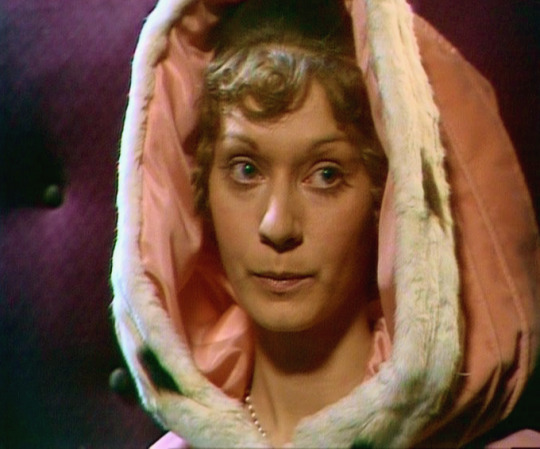
Doran Godwin, John Carson
Ah, the original 1970s BBC production! Truly a labour of love – six episodes running at forty-five minutes each, filled with minimalist sets, an ageing cast and drawn out scenes. Screenwriter Denis Costanduros and director John Glenister were old hands at churning out period dramas, but tastes have definitely changed. This is a very sluggish series, for the devoted fan only. Closest to the novel in dialogue and decorum, Janeites must be satisfied, but any Austen apprentices might be scared off by the stiff acting and slow pace.
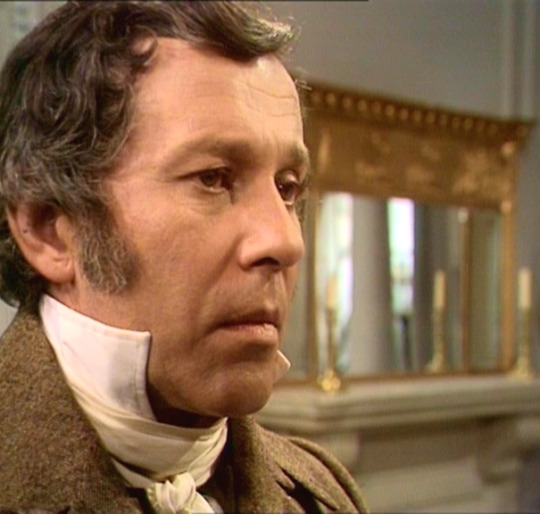
On rewatching the DVDs, I was pleasantly surprised by how quickly the four and a half hours flew by – only two sittings – and how enjoyable John Carson’s portrayal of Mr Knightley can be. My dislike of Doran Godwin in the role of Emma Woodhouse remains unaltered, however. She really brings the whole series down, with her forced elocution and rigid posture. I know certain amateur historians like to measure Austen adaptations by the ‘ladylike’ lack of natural expression and movement displayed by actresses, but Doran takes the Botox Method of acting to a whole new level. She delivers her lines like Lady Penelope and moves about the set like a dalek. Apparently, John Glenister saw Emma Woodhouse as being ‘disturbed/slightly unstable’, and cast Doran because she looked the part: ‘Slightly neurotic, a beautiful voice, and a natural grace’. (Well, two out of three ain’t bad.) Plus, Miss Godwin was only twenty-two at the time, the closest in age to Emma Woodhouse of all those who have played the character on screen, yet she looks at least ten years older. Helpfully for her, John Carson was forty-five, instead of Mr Knightley’s ‘seven and thirty’, and Meg Gleed, playing Isabella Knightley, looks older still! A most mature cast indeed.
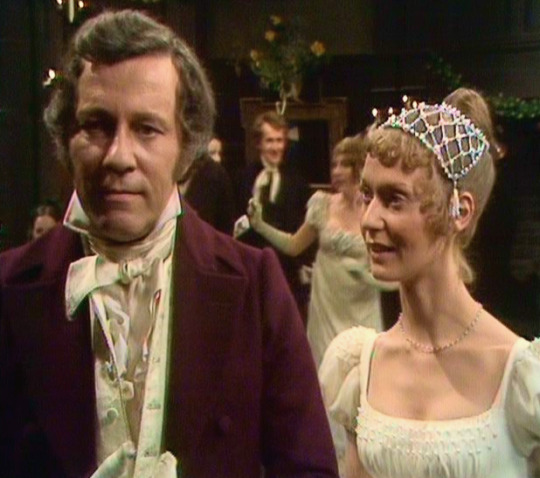
Plus points for me include John Carson, a most gentle, likeable and cheerful Mr Knightley, Fiona Walker owning the role of the very vulgar Mrs Elton, and a funny if rather frail Mr Woodhouse (Donald Eccles). Carson is far too old for the part, and thanks to the combination of his added eight years and Doran’s very proper portrayal of Emma, the romance between them never really catches on, but they have great screen chemistry on a purely platonic level. Mr Knightley is shown laughing with Emma (‘I wonder what you would do without someone like me to tease, Emma?’), joking with Mr Weston, and behaving like a gentleman with Miss Bates and Harriet Smith. Carson has a cheerful smile, sounds like James Mason, and carries off the Regency tailcoats and top hats with style. If only he were younger, he would be the perfect Mr Knightley! I know that some readers imagine the character to be a grumpy old man, but he’s really not – casting older actors like Carson, or dark, brooding types like Mark Strong, only serves to cement this common misconception about one of my favourite heroes. Fiona Walker is also perhaps slightly too old to play Augusta Elton, but who cares? She is fantastic, truly ill-mannered and ridiculous. I love the scene where she is playing up to Emma, offering her a plate of shortbread, then telling ‘Miss Smith’ to help herself from the tea tray with a dismissive sneer. In response, Doran’s haughty glare – possibly the one expression she truly mastered – is a sight to behold. Mr Woodhouse is perhaps more of a Dickensian caricature than Austen intended in this production, but Donald Eccles dodders and bleats for all his worth, and Costanduros gives old Mr Rumbleguts a few classic lines too (‘Poor Mrs Churchill. Took cold, no doubt, moving from one room to another’). The only scene that jars is his reaction to Emma’s news of her engagement, which borders on a demented tantrum.
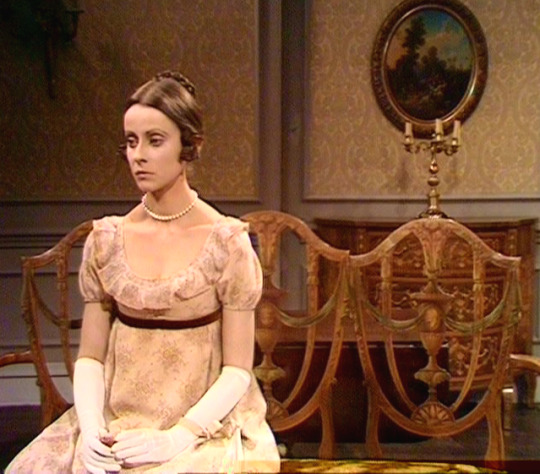
Less inspired casting choices, apart from Doran, include Debbie Bowen, who turns Harriet into a gushing simpleton (‘Oh, Miss Woodhouse!’), Ellen Dryden as a buxom but far from maternal Mrs Weston, and Ania Marson’s exotic and angry Jane Fairfax, who actually bellows at her poor aunt in one scene.
Costanduros adheres fairly faithfully to Austen’s novel, but even this lengthy adaptation indulges in dramatic licence on occasion, trimming the edges and bending the characters to fit. Emma and Mr Knightley’s argument over Harriet Smith and Robert Martin is cut short, John Knightley is written out of Emma’s party for Mrs Elton, and both Mr Elton and, crucially, Jane are absent from the Box Hill picnic. One particularly unnecessary revision which baffled me is the background to Jane’s stay in Weymouth – suddenly Mr and Mrs Dixon are new acquaintances looking to hire a governess, instead of Jane’s best friend and her husband. Yet Frank still uses Mr Dixon’s name to tease Jane and throw Emma off the scent – only why would Jane be avoiding her potential employer? Another confusing scene is the pianoforte duel between Emma and Jane at the Coles’ party – Jane sings and plays badly, after having her arm twisted by Frank, and Emma does neither! Finally, after insulting Miss Bates at Box Hill, Emma apologises directly to her the next day, which would never happen. But hey, at least the line most beloved by the Janeites – ‘Brother and sister? No, indeed! – is paraphrased, even if ‘Badly done, Emma’ is cut instead.
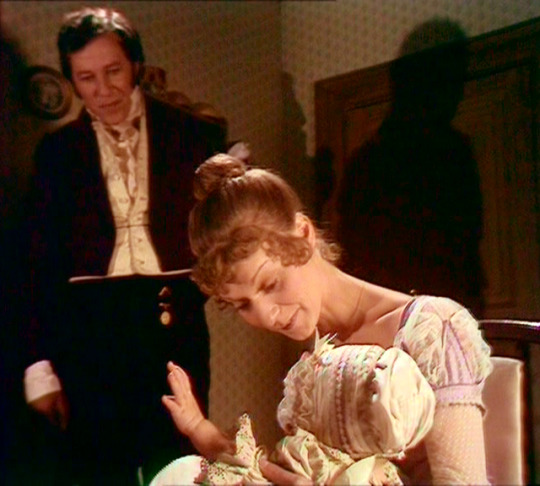
The scene in the nursery, with Emma and Mr Knightley making friends while holding Isabella’s baby, is well done, although the very lively child is more of a distraction than the patently fake dolls used in other versions. Harriet meeting the gypsies is also portrayed accurately, maintaining more of Austen’s ironic description than any other take I have seen – the gypsy children beg for money and frighten Harriet, but don’t physically attack her. Instead, she falls over while trying to run away, which is not very dramatic but far less offensive than a mob of feral gypsies manhandling a young woman and stealing her purse. Apart from these hidden gems, however, most of this adaptation is taken up with trivial scenes, like Frank Churchill buying gloves at Ford’s, and not the moments that really matter to the story. The ball is underplayed, cutting Mr Knightley’s strangely energetic choice of a dance with Emma, and the ‘proposal’ scene is very, very flat.

Comparing adaptations, I found the 1972 and the 2009 series to be similar at times, from small details like Emma’s chintz gown and the exterior of the house used for Hartfield, to the added emphasis on Emma and Mr Knightley’s companionship. Perhaps Sandy Welch was influenced by the BBC’s previous production? If so, she did well to choose a livelier leading lady and a younger Mr Knightley! Austen herself warned that Emma Woodhouse would be ‘a heroine whom no one but myself will much like’, and Doran Godwin certainly chose to play her that way. Doran’s Emma is dismissive of Miss Bates and sharp with her father. She drones out the dialogue without expression, while speaking through clenched teeth in a clipped accent. There is absolutely no charm or humour to the character at all, to the point where Mr ‘Knight-e-ley’s reluctant declaration of love is quite understandable. Sorry, but she ruined the story for me.

Would I recommend this adaptation? Yes, to those who have read the novel and seen all the other adaptations, but are still greedy for more, like myself. No, to those who want a flavour of what the novel is about – try Gwyneth Paltrow’s film for a short and sweet summary, or the 2009 miniseries with Romola Garai for a longer but no less entertaining screen translation.
#emma 1972#emma jane austen#emma woodhouse#mr knightley#doran godwin#john carson#denis costanduros#john glenister
2 notes
·
View notes